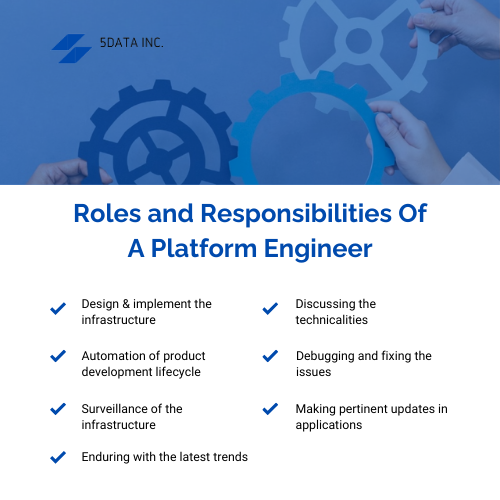Platform Engineering
Platform engineering is a process of constructing systems and tools that are meant for internal use by software development teams. Platform engineers aim to enhance developer productivity by developing a self-service platform that automates routine tasks. Platform engineering is a process of constructing systems and tools that are meant for internal use by software development and operations teams. Platform engineering and engineers aim to enhance developer productivity by developing a self-service platform that automates routine tasks.Key Takeaways
- Platform engineering automates tasks for enhanced productivity in software development.
- Internal developer platforms offer self-service tools for streamlined DevOps processes.
- Product engineering delivers high-quality products aligned with business objectives.
- Advanced practices include serverless computing, AI, ML, and DevOps.
- Platform engineers oversee infrastructure, automation, monitoring, and innovation.
Comparing Platform, Developer, and Product Engineering
A. Platform engineering
Platform engineering refers to the process of creating platforms that enable quick development and deployment of software products. These platforms typically consist of common components like databases, web servers, application servers, user interfaces, and more, which can be reused across multiple applications, helping the developers to create new applications rapidly without having to start from scratch every time. By offering common frameworks and components as part of their platform engineering team offering, companies can reduce development time while still delivering top-notch products to their customers.B. Internal developer platform
An internal developer platform can help teams become more efficient, thereby reducing organizational costs and creating a productive and enjoyable experience for developers. Such internal developer platforms treat developers as internal customers with clearly defined needs, goals, and resource utilization constraints. By providing self-service tools through Application Development Services, these platforms eliminate the burdensome aspects of DevOps while ensuring that developers have the necessary resources to complete their work. IDPs help to create a “golden path” that defines and supports an optimal process for fast, smooth development and helps to reduce security risks and increase ROI.C. Product engineering
Product engineering is the application of engineering principles and practices to the entire product lifecycle, including design, development, testing, and optimization. It can apply to software engineering or the design of new products like electronics, industrial equipment, or automobiles. Successful product engineering delivers both innovative solutions and high-quality products that meet functional and technical requirements, elevate user experiences, and complement an organization’s business strategy. It is useful for an organization to systematize the product engineering process and designate product managers for timely and cost-effective development and deployment processes to maximize a product’s value.Importance Of Platform Engineering
The concept of platform engineering is agile, reliable, reusable, efficient, scalable infrastructure, collaborative, and organized. Platform engineering is a crucial part of contemporary software development as it enables companies to create and launch applications rapidly while ensuring high-quality standards. Moreover, when platform engineering is coordinated with a top application development company, it lowers the repetition of work, as teams don’t have to recreate components every time they require them for a new project. Full platform engineering involves a consistent and transparent software development methodology across an organization, which leads to better coordination between business and technological objectives.Advanced Practices In Platform Engineering
Numerous trends and emerging technologies, such as artificial intelligence, machine learning, serverless, cloud computing, and DevOps, are currently influencing the field of platform and software engineering. These advancements are providing businesses with fresh opportunities to utilize technology more efficiently and effectively than ever before.1. Serverless computing
Serverless computing is a method of running applications without the rush to manage any underlying infrastructure resources. This approach to managing infrastructure and cloud computing enables companies to scale their applications easily and cost-effectively without worrying about managing servers or other hardware components. It eliminates the need for businesses to manage servers and other infrastructure components, making it a more efficient and convenient way to run applications.2. Artificial Intelligence & Machine Learning
AI and ML have changed the dimensions of businesses. They can automate repetitive or boring tasks and infrastructure as code, freeing up time for more important activities by development teams and operations teams. Furthermore, AI can assist organizations in making more informed decisions by analyzing data, which results in increased efficiency and accuracy throughout various industries.3. DevOps
DevOps is a methodology in software development that integrates software development processes with operations management to improve collaboration between teams and reduce time and effort in marketing products or services. By utilizing automation tools and security practices suggested by automated functional testing services like continuous integration (CI) and continuous delivery (CD), organizations can improve their agility while ensuring quality control throughout the software development lifecycle and process.
Roles and Responsibilities Of A Platform Engineer
Platform engineers are responsible for managing, designing, and implementing platform engineering, which involves the infrastructure that enables applications to function seamlessly. Let’s take a closer look at platform engineering roles roles and some of its core responsibilities:1. Design & implement the infrastructure
Platform engineers design and implement infrastructure for applications. They select hardware and software, configure resources, and establish security policies for managing infrastructure. They also consider reliability, optimal performance, and disaster recovery for scalability and load handling.2. Automation of product development lifecycle
Platform engineers automate the testing frameworks, development, and configuration management processes, helping reduce errors and improve the efficiency of the development process. Platform engineers manually configure servers, install software components, and test applications in a manual deployment process. Autonomous delivery teams use tools like configuration management software, CI/CD pipelines, and container orchestration platforms to do infrastructure management and enable developers to perform tasks and deployment processes automatically. Automation reduces errors, saves time, and allows for more frequent software deployments.3. Surveillance of the infrastructure
The Platform Engineer sets up the infrastructure and secure platform and monitors its performance with tools like log analysis, performance metrics, and alerts. They investigate and resolve any problems detected quickly to minimize the impact on the development environment and the application’s performance.4. Discussing the technicalities
Platform engineers work with software engineers and QA analysts to solve technical issues and meet infrastructure needs. Good communication, continuous improvement, infrastructure management, and collaboration are crucial for successful application development and maintenance.5. Debugging and fixing application issues
Platform engineers ensure software applications run smoothly. They identify issues and make necessary changes to fix them, minimizing disruption for users and enabling organizations to avoid negative impacts on user experience, downtime, and revenue loss.6. Making pertinent updates in applications
Platform engineers maintain and secure the system performance underlying infrastructure and distributed systems, including hardware, software, and storage resources. Engineers, under the assistance of the best mobile security testing services, keep their infrastructure components and software development processes up-to-date with the latest security patches to mitigate risks. Before deploying updates, they test for compatibility and performance issues. To update systematically, evaluate impact, check compatibility, test, and deploy.7. Enduring with the latest trends
Tech is always changing. Platform engineers need to keep up-to-date to ensure applications and secure platforms are efficient. Knowing new trends can help the platform engineering team and operations teams improve performance and cut costs.Conclusion
Platform engineering is critical in modern software development. It allows for scalable, cost-effective, and reliable systems that handle increased traffic and maintain high-performance levels. Key features include automated deployment, continuous integration, containerization, monitoring, alerting, and cost optimization. Platform engineering offers scalability, reliability, cost-effectiveness, time-to-market, and efficiency advantages. By leveraging the latest tools and technologies, platform engineering engineers can build robust, scalable, and reliable platforms.Platform Engineering FAQs
1. What is platform engineering, and how does it differ?
- Platform engineering constructs internal systems and tools to boost developer productivity through automation, while internal developer platforms streamline DevOps, and product engineering aligns products with business goals.
2. What are the key benefits of platform engineering?
- Platform engineering streamlines software development processes, enhances developer productivity through automation, improves collaboration between teams, and accelerates application delivery.
3. How do serverless computing and AI affect platform engineering?
- Serverless computing offers scalable, cost-effective solutions, while AI automates tasks and boosts efficiency, optimizing resource use and improving accuracy in platform engineering strategies.
4. What are the roles and responsibilities of platform engineers?
- Platform engineers design and implement infrastructure, automate development processes, monitor performance, debug issues, and stay updated on industry trends to ensure seamless application delivery.
5. How can businesses use platform engineering?
- Platform engineering streamlines processes, shortens product time-to-market, fosters team collaboration, and delivers quality solutions, ultimately enhancing customer satisfaction.

About the Author...
Aparna Sushumna, a mother to a hyperactive toddler who is all over the house. I aspire to be a decent content developer. A Bachelorette of technology says my qualification but I anticipated being a singer. Thanks to the recession, I dwelled into various jobs, from coding to being a tech support executive to a help desk professional, only to conclude that there is something else I wish to do. Here I am to accomplish my profound passion for content writing. Music, nature, jewelry, beauty, mythology, life quotes, celebs, and their life, being my areas of interest.
